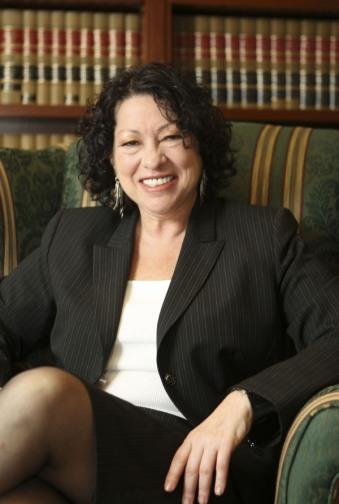 "So, what do you think of Sotomayor?," one of our neighbors asked me, hastening to tell me that she was impressed -- by the childhood diabetes, by a life of growing up in the projects, of placing second in Princeton, of being nominated by a president who's no slouch himself. So am I -- by the life story -- but something about Sotomayor gives me pause.
"So, what do you think of Sotomayor?," one of our neighbors asked me, hastening to tell me that she was impressed -- by the childhood diabetes, by a life of growing up in the projects, of placing second in Princeton, of being nominated by a president who's no slouch himself. So am I -- by the life story -- but something about Sotomayor gives me pause.My first impression was favorable. One of the best gauges of a judge's intellect is the minority opinions she writes -- she is going against the safe consensus and sticking to her guns. You can see how she thinks by looking at dissents. And the dissent that I looked at was Croll v. Croll. Mom & Dad are American citizens living in Hong Kong. They divorce. The Hong Kong court grants Mom custody, but awards Dad visiting rights and says that Mom is not allowed to take the kid out of Hong Kong without Dad's permission. Mom grabs the child and comes to the US anyway. Now, the US is signatory to an international convention that honors marriages, divorces and custody agreements recorded abroad (otherwise, I wouldn't be married to my wife!). The majority rules that Dad didn't have custody -- that would be Mom -- and visitation rights are not covered by the international convention. Sotomayor disagreed and wrote a dissent that said that when the Hong Kong court imposed restrictions on the child's travel, effectively the court had custody of the child. When Mom violated those conditions, custody reverted back to the court. Since what Mom did (absconding with the child) was totally unlawful, her judgment is inherently more fair.
My second impression was lukewarm. This was the Ricci case where white New Haven firemen didn't get a promotion after they were promised that the top three test takers would be promoted. New Haven was afraid of being sued under the disparate impact doctrine that underlies much civil rights enforcement. The legal question before the court was whether New Haven could reasonably be sued -- they obviously could -- but the real question was whether the disparate impact doctrine was fair. Where she argued in terms of fairness in the Croll case, she ducked the real question in the Ricci case. Arguably, that's more conservative -- judges should not be making policy after all -- but it is certainly unfair to the white, dyslexic fireman who filed the case.
The third impression is decidedly negative. This was Jocks vs. Tavernier. Jocks tried to make an emergency phone call about an incident that could have tied up the New Jersey expressway. Tavernier was hogging the phone and refused to give it up. Finally, Jocks hung up forcibly and dialed 911. Tavernier turned out to be an undercover cop; he and another cop arrested Jocks. Jocks sued for malicious arrest. Tavernier claimed that Jocks hit him with the phone and that's why he arrested him. The jury believed Jocks and awarded him damages. This is a classic he-said-she-said case, and judges ought to defer to juries on who's more believable. But Sotomayor, a former prosecutor, convinced the other judges to throw out the jury's award. That, to me, is an activist judge.
So what do I think of Sotomayor? Impressive life story; a not-very-good writer and a judge who can sometimes rule based on the spirit of the law, but more often than not sticks to its letter. The worst rulings of the supreme court in the past few years have been gross miscarriages of justice that happened because the justices stuck to the letter of the law. I'm referring to decisions like: deciding that eminent domain could be used on behalf of private developers; turning down a claim of gender discrimination because it was too late even though the defendant could not have known about it earlier; of turning down an appeal because it was filed a day too late (even though the court told the defendendant the wrong deadline); of deciding that strip-searching a 13-year old honor student was a reasonable use of a school's discretion.
We don't need one more justice using the letter of the law to perpetuate unfair outcomes.
UPDATE: One more case where this happened:
she not only didn’t let her sympathies get in the way, but she may have gone too far in ignoring human “emotions and sympathy” to rule based on hyper-technicalities. By “emotions and sympathy,” I don’t mean bias; I mean the fact that discrimination cases are inherently about whether a supervisor made an employment decision based on an emotional, rather than an objective, assessment of an employee. And that requires a judge to let herself empathize at least a little with the situation the case presents.
thanks for your well-considered and interesting post.
ReplyDeleteFyi, there seems to be a racial dimension to the Jocks case that wasn't discussed in the slate article (the cop was Haitian-American, while Jocks was white):
http://www.webster.edu/~corbetre/haiti-archive/msg04657.html
Read the post left by the anonymous poster (above). That poster claims that the reason that the jury found in favor of Jocks is that the lower court judge refused to let him call witnesses who would corroborate his story. Which of course changes this considerably -- then Sotomayor was definitely righting a wrong.
ReplyDeleteIf that's true, I'm now back on the fence.